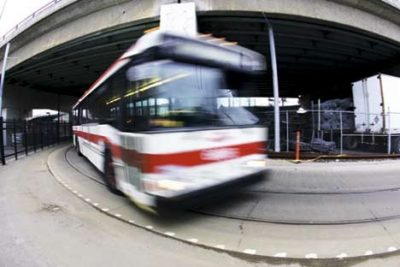The Case for Free Public Transit in Toronto
There are 200 cities around the world with some form of free public transit, and 97 that are completely free

Free public transit is a growing movement around the world.
According to the book Free Public Transit: And Why We Don’t Pay To Ride Elevators, there are 200 cities around the world with some form of fare-free transit, and 97 that are completely fare-free.
Tallinn, the capital of Estonia, implemented free transit in 2013, and it was adopted nationwide last year. Luxembourg is another country where transit is free. The idea has also gained traction in the United States. Kansas City is set to become the first major city in North America with free public transit. On December 5, their city council voted unanimously to eliminate bus fares.
Fare-free transit makes sense. Basic mobility is essential for all people for work, household tasks and broader participation in society. Transit should be accessible to all as a public service. After all, we don’t charge user fees for libraries, parks, schools and health care.
Moreover, the urgency of the climate crisis demands bold action. Encouraging public transit use would ease congestion and make our streets safer.
In an increasingly expensive and unequal city, abolishing fares would also greatly improve the quality of life for poor and working-class Torontonians for whom the cost of the TTC represents a serious economic hardship. The money currently being spent on fare enforcement could certainly be put to better use.
While transit advocates have historically prioritized improved service over abolishing fares, the two are intertwined. Expanding the transit network, particularly into underserviced neighbourhoods, will create quality jobs and add to the tax base.
Right now, there is little political support for abolishing transit fares in Toronto. Josh Matlow is the only city councillor on record to support the idea.
But in July, CUPE Local 2, which represents TTC electrical workers, came out in favour of free transit. The NDP pledged to support cities interested in moving toward fare-free public transit in the recent federal election. And Michael Coteau, who is running for the Ontario Liberal leadership, has called for the elimination of transit fares in the province within a decade.
It’s certainly true that free public transit is an expensive proposition. Paying for it will require a dramatic shift in political priorities. The Harris government’s cut to the provincial operating subsidy two decades ago – which paid for half of the operating costs – has devastated the TTC. As a result, the transit system is now the least subsidized in North America, with 70 per cent of its operating costs paid for by fares.
How would we pay for free transit?
The $1.2 billion in lost revenue would have to be made up. And that’s not including the cost of expanding the system to accommodate an increase in ridership.
The downloading of operating costs by the provincial government would have to be reversed. Free Transit Toronto is calling for a massive increase in federal and provincial funding financed by a more progressive tax system. Re-allocating provincial spending on highways would help. There is room to contribute at the municipal level as well.
Despite Mayor John Tory’s recent pledge to increase property tax rates to pay for much-needed services, more can be done. A congestion charge and a parking levy, for example, are permissible under the City of Toronto Act. In addition, the city could cut the ever-increasing police budget and abandon the Gardiner Expressway extension.
Free public transit is attainable. The city has already eliminated fares for children 12 and under, and it has been a huge success.
It doesn’t have to happen all at once. Free Transit Toronto is calling for the gradual elimination of transit fares over time, beginning with seniors, people on social assistance and the unemployed, as well as during extreme weather alerts (Paris already does this).
In addition, the group stresses the need for public ownership of all transit services.
With free public transit, we can tackle climate change and growing inequality and create a more livable city.
*
Note to readers: please click the share buttons above or below. Forward this article to your email lists. Crosspost on your blog site, internet forums. etc.
Saron Gebresellassi is a human rights lawyer. Matt Fodor is a Ph.D. candidate in political science at York University.
Featured image is from NOW Magazine

